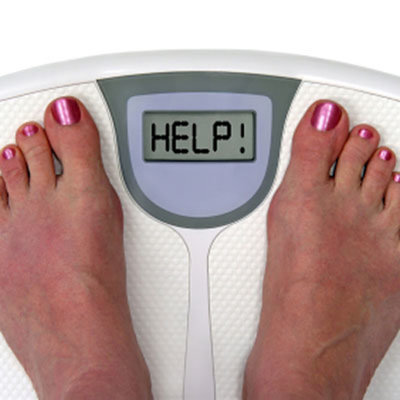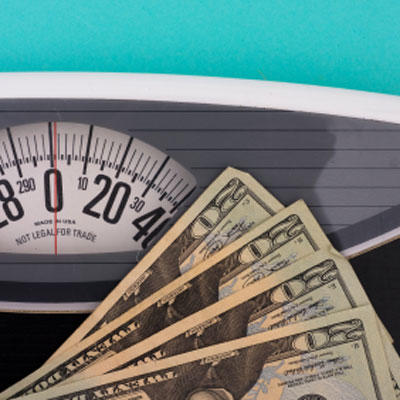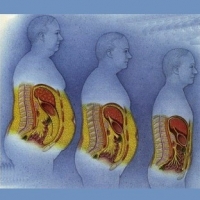1 of 12

Put your mind to it
Could the key to maintaining weight loss be in the power of the mind? Research indicates successful dieters may have rewired their brains to control their response to food.
A study conducted by Brown Medical School compared the brain activity responses to images of low- and high-calorie foods between three groups of participants: normal weight, overweight, and dieters who had successfully lost at least 30 pounds and kept it off three years or more.
The tests revealed parts of the brain recruited for complex tasks and inhibition were more active in the dieters than those of normal weight, which indicates weight-losers may make a greater effort to avoid indulging.
Researchers are uncertain as to when or how these mental patterns are formed (e.g., during the process of becoming obese or while dieting), but discovering associations between the mind and eating behavior may provide a mental edge for would-be dieters.
2 of 12
3 of 12

Stress may lead to...healthy eating?
Stress is often associated with a tendency to numb anxiety with a bucket of ice cream or to soothe ragged nerves with a soft drink, thereby causing many a dieter's downfall. However, a series of studies conducted at the University of South Carolina found that stressful times do not always trigger the comfort-food instinct.
Surveys of hundreds of university students revealed a positive correlation between increasing levels of stress and a tendency to choose unfamiliar food items, even among those who agreed most people under stress turn to comfort foods.
This trend was consistent with non-food choices as well, with students reporting the most significant life changes opting for lesser-known brands.
Although these results were based on hypothetical scenarios versus actual responses to real-world conditions, researchers believe the findings might indicate that times of transformation make a person more open to change. Being aware of these opportunities may encourage people to make more positive decisions, including taking steps to improve one's health.
3 of 12
4 of 12

Yo-yo dieting linked to drug addiction
Do you find yourself endlessly jumping from one failed diet to the next? A study conducted at the Boston University School of Medicine suggests yo-yo dieting may mimic the effects of a drug addiction, thereby making weight loss an even greater challenge for chronic dieters.
Researchers found that when switched to a diet of regular chow, rats formerly fed a sugary, chocolate-flavored food showed stress signals and brain patterns similar to those displayed during withdrawal from alcohol or drugs. However, blocking a system linked to stress in the brain seemed to help the rats cope with the feeding transition.
Researchers believe the same phenomenon may occur in people who are used to overeating when they begin dieting. As with ceasing drug use, decreasing food intake can release stress hormones in the brain, which may lead to the anxiety, lack of motivation, and poor food choices that make it difficult to successfully stick with a diet.
Although these findings may help identify potential hurdles to losing weight, researchers are not sure how they might be applied to a treatment for human obesity.
4 of 12
5 of 12

Açai berry: Miracle fruit or scam?
Touted as the latest, greatest source of antioxidants, açai berries are showing up in all kinds of food products, even jelly beans.
There's little doubt this South American gem is full of fiber and nutrients, but a lack of scientific evidence to back widespread claims that the fruit aids in everything from weight loss to wrinkle prevention has experts cautioning consumers.
An investigation by the Center for Science in the Public Interest, a nonprofit health group, has uncovered several Internet scams in which customers are asked to give credit card info for shipping and handling charges for "free trials" and are then billed nearly $100 a month.
Bottom line: Experts agree açai berries are a healthy addition to any diet, but not a magic bullet for weight loss. There are plenty of other fruits and veggies that offer similar nutrition benefits; rather than rely on pricey açai powders or capsules, check out your local farmers' market for some fresh additions to your diet.
5 of 12
6 of 12

Your "natural" weight-loss supplement may be a health hazard
Quick-fix dieters beware: Those magical "all-natural" pills promising rapid weight loss may come with some nasty side effects. An ongoing U.S. Food and Drug Administration (FDA) investigation has found several diet supplements containing everything from unapproved prescription drugs to laxatives and even anti-seizure medications.
Undeclared ingredients and unknown amounts of some additives make it difficult to predict potentially harmful interactions with other prescriptions. (For example, consumers already given diuretics for heart conditions may end up taking multiple doses. Common side effects of supplements can also include heart palpitations and seizures.)
Unfortunately, it is difficult for the FDA to regulate every product promoted on the Internet, but one of its main goals remains consumer awareness. The FDA recommends discussing weight-loss options with your physician and choosing only an FDA-approved supplement if necessary. Those approved include sibutramine (Meridia), orlistat (Xenical), and a low-dose version of orlistat that is sold over the counter (Alli).
6 of 12
7 of 12

Fasting on alternate days may make dieting easier
Cutting caloric intake dramatically to help you stay on a diet may seem counterintuitive, but a research team at the University of Illinois at Chicago found it may actually be an effective weight-loss strategy.
A group of 16 obese men and women participated in the 10-week study, which was divided into three phases. During the first two weeks (phase 1), the participants followed their normal diet. Over the next four weeks (phase 2), they ate normal one day and then much less (about 20% to 25% of their daily caloric needs) on alternate days. For the remainder of the study, dieters were able to choose the food they ate (with the guidance of dietitians) while following the alternate-day fasting meal pattern to illustrate whether the subjects could stick to the plan on their own.
At the end of the study, participants lost an average of 10 to 30 pounds, while also lowering their blood pressure, cholesterol levels, and heart rate. Although these results are promising, researchers hope to determine the sustainability and long-term success of the diet in future studies.
7 of 12
8 of 12

Atkins diet tougher on heart after weight loss
Popular diets such as Atkins, South Beach, and Ornish may help trim your tummy, but how do they affect your ticker over time?
To answer that question, researchers funded by the National Institutes of Health monitored 18 healthy participants who followed each of these diets for four weeks with "wash-out" periods in-between. They found a positive correlation between the amount of saturated fat in the weight-loss plan and reduced blood vessel dilation, which can inhibit blood flow.
With 50% calories from fat and an average of 30 grams of saturated fat per day, the Atkins diet resulted in the greatest blood vessel constriction, compared to South Beach (30% fat and 14 grams saturated fat) and Ornish (10% fat and 3 grams saturated fat). Atkins also slightly increased LDL, or bad cholesterol, levels (although not significantly), while LDL decreased for the other diets.
More extensive research is needed, but this abbreviated study indicates a diet high in saturated fat may contribute to heart disease risk, even when used to lose weight.
Bottom line: It is important to consider the source of calories, not just the total amount, when it comes to healthy weight loss.
8 of 12
9 of 12

Put your money where your mouth is
A recent study found that gaining—or losing—money may be a powerful motivator for dieters. Overweight or obese participants given financial incentives lost more than three times the weight (13–14 pounds) shed by self-motivated dieters. The participants were given nutrition and exercise advice at the beginning of the study but were left to devise their own weight-loss strategy.
Some dietitians argue rewards may not be the best long-term solution to weight loss, since it does not necessarily help establish healthy eating patterns and behavior for better weight management.
However, with the increasing costs of medical care associated with obesity, businesses may find small monetary rewards a budget-friendly way to motivate employees to get into better shape.
9 of 12
10 of 12

The happy diet
Sure, both low-fat and low-carb diet plans can help you slim down, but is one method better at keeping you in a chipper mood while dodging doughnuts and quelling cravings?
A recent study in Australia found dieters on both low-fat and low-carb calorie-restricted diets felt happier after two months of dieting. But only low-fat dieters reported improved moods a year later, despite similar weight-loss success.
Nevertheless, previous research from Duke University Medical Center shows either diet results in similar improvements in mood, with the greatest benefits reported by low-carbers.
Researchers believe this discrepancy may be due to the difference in food volume allowed—the Australian low-carb diet restricted food intake, whereas Duke's did not. In other words, dieters who do not feel so deprived may be less cranky.
With the jury still out on the low-carb question, for the best long-term success, experts agree it is better to find (and stick to) a healthy, well-balanced weight-loss plan that works for you.
10 of 12
11 of 12

Mediterranean diet: More than just a weight-loss plan
It's baaack: The Mediterranean diet has already been touted as a healthy weight-loss plan and may even keep your brain in top shape, but an Italian research group found it may also be especially good for type 2 diabetics. Beyond helping these patients lose weight and lower their risk for heart disease, the Mediterranean diet also appears to aid in blood-sugar regulation.
The study found 70% of newly diagnosed type 2 diabetes participants who followed a low-fat diet for four years required medication to manage blood glucose, compared to just 44% of those on the Mediterranean diet. Incidentally, cholesterol levels and blood pressure readings also showed greater improvement in the Mediterranean versus the low-fat group.
A combination of diet and exercise is still the best recommendation for managing type 2 diabetes, but if going Mediterranean appeals to your taste buds, this may be a successful weight-loss option for you.
11 of 12




